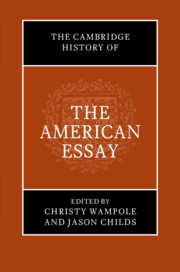Book contents
- The Cambridge History of the American Essay
- The Cambridge History of the American Essay
- Copyright page
- Contents
- Acknowledgments
- Notes on Contributors
- Introduction
- Part I The Emergence of the American Essay (1710–1865)
- Part II Voicing the American Experiment (1865–1945)
- 9 Writing Freedom before and after Emancipation
- 10 Social Justice and the American Essay
- 11 “Zones of Contention” in the Genteel Essay
- 12 The American Comic Essay
- 13 Nineteenth-Century American Travel Essays: Aesthetics, Modernity, and National Identity
- 14 American Pragmatism: An Essayistic Conception of Truth
- 15 The Essay in the Harlem Renaissance
- 16 The Southern Agrarians and the New Criticism
- 17 Subjective and Objective: Newspaper Columns
- 18 The Experience of Art: The Essay in Visual Culture
- 19 The Essay in American Music
- Part III Postwar Essays and Essayism (1945–2000)
- Part IV Toward the Contemporary American Essay (2000–2020)
- Recommendations for Further Reading
- Index
12 - The American Comic Essay
from Part II - Voicing the American Experiment (1865–1945)
Published online by Cambridge University Press: 28 March 2024
- The Cambridge History of the American Essay
- The Cambridge History of the American Essay
- Copyright page
- Contents
- Acknowledgments
- Notes on Contributors
- Introduction
- Part I The Emergence of the American Essay (1710–1865)
- Part II Voicing the American Experiment (1865–1945)
- 9 Writing Freedom before and after Emancipation
- 10 Social Justice and the American Essay
- 11 “Zones of Contention” in the Genteel Essay
- 12 The American Comic Essay
- 13 Nineteenth-Century American Travel Essays: Aesthetics, Modernity, and National Identity
- 14 American Pragmatism: An Essayistic Conception of Truth
- 15 The Essay in the Harlem Renaissance
- 16 The Southern Agrarians and the New Criticism
- 17 Subjective and Objective: Newspaper Columns
- 18 The Experience of Art: The Essay in Visual Culture
- 19 The Essay in American Music
- Part III Postwar Essays and Essayism (1945–2000)
- Part IV Toward the Contemporary American Essay (2000–2020)
- Recommendations for Further Reading
- Index
Summary
This chapter delivers the rich history of the American comic essay. From its inception in the seventeenth century, sociopolitical concerns have dominated the genre. Borrowing from British sources and employing features common to humorous writing, the American comic essay customizes these for an American public using national imagery, local allusions, and distinctly American language. Earlier humorists voiced independent religious and political ideologies even before the formation of the new nation. Later, fictional personae expressed themselves in hyperbolic style and used vernacular and vulgar language, laden with irony and sarcasm, to capture the discontinuities of the industrializing nation. Articulating ethical visions of the new democracy, literary comedians like Artemus Ward expanded the naïve, deadpan voice brought to international prominence by Mark Twain. Later essayists maintained the rhetoric, persona, exaggeration, and irony that caricature American pragmatism, and further expanded the range of themes to include personal psychology, sexuality, and other once taboo topics. The chapter’s final pages feature the diverse contemporary landscape of American humor writing.
Keywords
- Type
- Chapter
- Information
- The Cambridge History of the American Essay , pp. 197 - 217Publisher: Cambridge University PressPrint publication year: 2023

